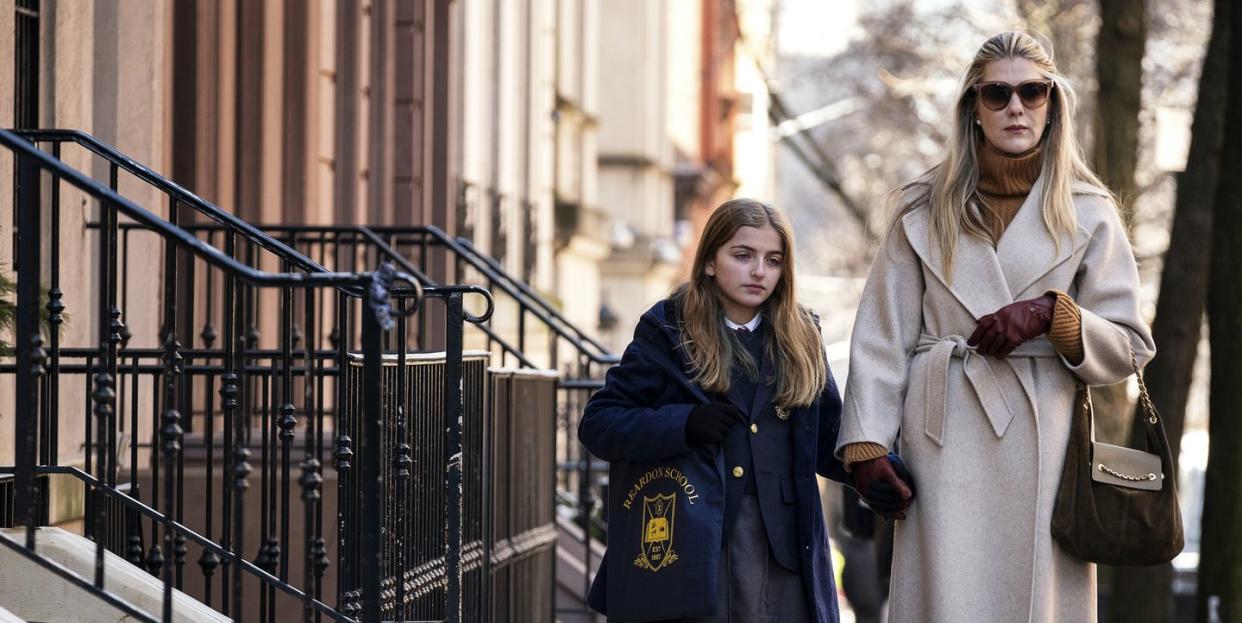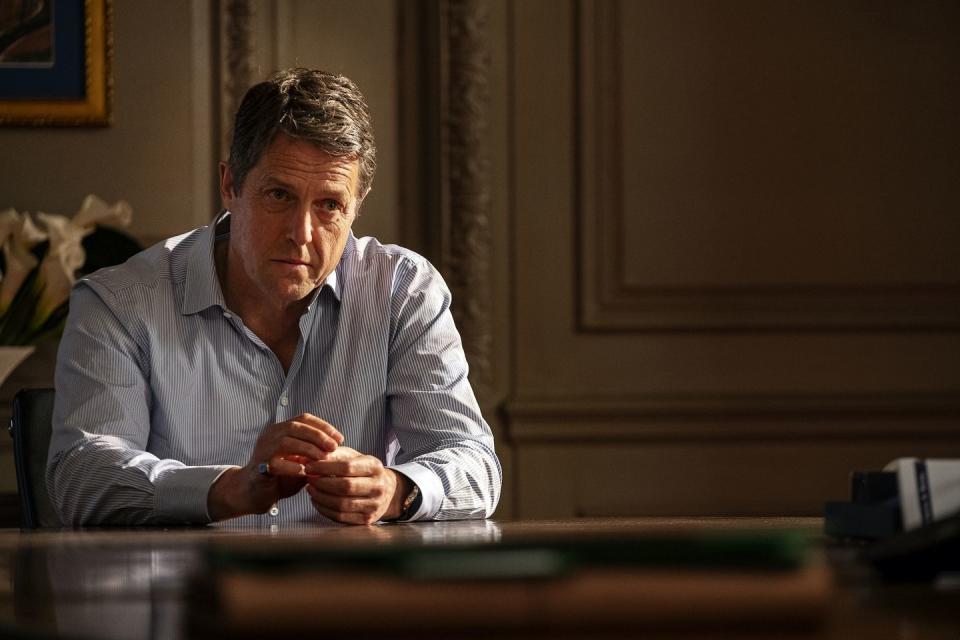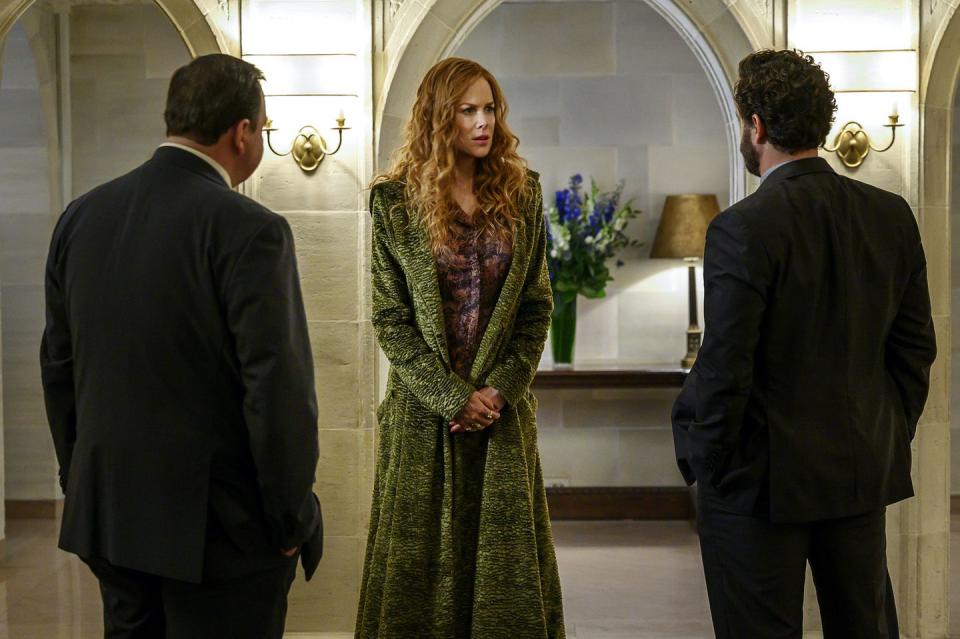The Undoing's Author Jean Hanff Korelitz Was "Really Surprised" by the Finale

- Oops!Something went wrong.Please try again later.
Jean Hanff Korelitz is the author of You Should Have Known, the book that inspired HBO's The Undoing.
Korelitz wasn't involved with the making of The Undoing—so she was as surprised by the finale as the rest of us.
Below, Korelitz speaks to OprahMag.com about Hugh Grant's deceptive charm, her ongoing Undoing theories, and how the book compares to the show.
Warning: This contains spoilers for the finale of The Undoing.
Jean Hanff Korelitz didn't see the ending of The Undoing coming. Never mind that she wrote the book that inspired the HBO miniseries, originally called You Should Have Known. Never mind that she, like the rest of us, "should have known" better than to overlook the most obvious suspect: Korelitz, too, was swayed by Grant's charm.
If the finale of The Undoing seemed a bit anticlimactic, that's only because the series was successful at proving its central thesis, borrowed from Korelitz's book: We can overlook anything, if we want to badly enough.
Despite being a psychologist, Grace (Nicole Kidman) overlooks key signs of her husband's (Hugh Grant) sociopathy—until it's too late. And despite years of crime shows illustrating the age-old adage, "It's always the husband," audiences were quicker to blame the murder on Sylvia (Lily Rabe), Grace's friend, than on Jonathan.
Part of the confusion was smoke and mirrors: The Undoing's writer David E. Kelley publicly said that the show deviated from the book after two episodes, leading many—including Korelitz—to believe the killer would be different. Speaking to OprahMag.com, Korelitz opens up about the experience of having her show adapted, her wildest Undoing theories, and more.
Were you surprised by the ending on Sunday night?
I was really surprised. I was invested in Sylvia Steinmetz. I really thought I had it figured out.
What was your theory?
My theory was that Jonathan or Frederick [Grace's dad] was the father of Sylvia's child. And that Sylvia was the other person that Jonathan had admitted having an affair with. She had gone after Jonathan, and then killed Elena. There were a lot of plot holes in my theory. Like everybody else, I assumed it couldn't be this obvious person. I also thought that David [writer David E. Kelley] had wanted to move away from the book. I didn't realize he would come back—because it really was the right answer. He added so many layers to it along the way. It was very satisfying to me.
A lot of people on Twitter were citing the name of your book, You Should Have Known, as if to say, we should have known all along.
That's very meta.
You were also charmed by Hugh Grant. What did you think of him in the role of Jonathan?
I watched the last episode with my husband and son, and we were stunned by Hugh Grant. There's a scene in the courtroom where it's as if you're watching the warmth drain out of him. There's nothing left but pure ice in his eyes. That was very rewarding to see. When you describe a character you can write about those things, but to see them in the flesh is riveting.

Is that the moment you knew Jonathan did it?
Pretty much. Grace gets up there, and we're all trying to figure out what the ramifications of her legal testimony are. Then we realize that she's maneuvered this into place so that she can get rid of him because he's a monster, and she finally has accepted that. Maybe she realizes she can't trust herself not to be persuaded by him anymore. She really has to put him in a cell. That's the only way her family will be safe. I was like, You go girl. Good for you.
In the book, Grace takes a much different approach. She retreats to Connecticut. What was it like to see the parallel universe Grace assert herself in that moment, and out manipulate Jonathan?
I think that's an apt description—a "parallel universe." I tend to think of it as a "variation of a theme." It's something I learned from my friend Meg Wolitzer, who has had a bunch of her novels adapted into film. If you're lucky enough to have your work adapted, you have to embrace that, or else you'll be super miserable.
This is my second go-around with adaptation [ed. note: first was the movie Admission]. I learned a lot with that first round, in terms of what you hold on to, and what you don't. Having it all in David E. Kelley's hands was like having the greatest surgeon in the world come in to reset your broken thumb. What are you going to say? Make sure you don't do it off-center? He's a master. He knew exactly what he was doing.
What would you say the theme of your book was, and how did the show rework it?
The idea behind the book was our vulnerability to fictionalize our own lives and to fill in the gaps to make ourselves comfortable when things are uncomfortable. If there's something that doesn't seem right in someone we love, we will rush to fill that gap with a fiction in order to make ourselves feel safe. Rather than say, Hey, there's a real problem here and I’m going to have to consider moving out of my house, getting a restraining order, explaining myself to every single person I know, admitting to myself that I was taken in, protecting my child...There are many good reasons to not want to upset the apple cart.
There was an extra layer. What if this person who is undergoing this brutal reevaluation is actually somebody whose job it is to tell other people how to live their lives? In the book she's just written a book, You Should Have Known.
What I had in the back of my mind was an incident many, many years ago. The year I got married, in 1987, Martha Stewart had just published this enormous book called Weddings, which I was obsessed with. I knew every single page as I was planning my wedding. Just before she published this massive book her husband left her. I remember thinking at the time, Could you not wait until after she published the huge book called Weddings in which she wrote about how happily married she was? It was just a cruel, cruel thing to do. That's why in the book, Jonathan leaves just as Grace is about to stake her reputation on this book.
Do you agree with Grace's central premise in the book? That people "should know" who they're marrying, and if they don't, it's their fault?
I grew up with a therapist for a mother. My mother was very—well, you might say obsessed, but let's say fixated—on the ways in which her women patients in particular could be so brilliant and so stupid. She'd tell my sister and me these stories about her patients. She'd say things like, 'I have this patient who's a CEO, who went to Harvard, and she's with someone who's clearly stealing from her, isolating her from her family, cheating on her, or has another family.'
We all grew up just absolutely fascinated by this conundrum. Making Grace a therapist was the decision where all of this began. What if the person who was so taken in was was the person who's out there on a soapbox, telling others to beware?
Nicole Kidman plays Grace in the show. Who did you picture as Grace while writing?
There was a mom in Princeton where I lived for many years who was married to a world famous mathematician. She had these three perfect daughters and was also a brilliant academic herself. Every time I saw her, she was so immaculate. In my mind, that's what Grace looked like. She's kind of buttoned up in the book.
Right, she doesn't have those coats in the book.
She sure does not have those coats. Oh, those coats. The minute I saw that coat, I just knew it was going to be all about the coat.

With new readers seeking out your book, is there anything you want them to know?
Well, I'd like to remind them that the book was written a long time before the series. It did not anticipate or include many of the elements that we've all spent the last six weeks obsessing over. On the other hand, there are other revelations that are not in the TV show, especially around the baby. There's a lot about the baby.
The emphasis is not on who did it. It's on, How could this have happened to me? Many readers are not happy with that. They wanted detective story. They wanted a "whodunnit." And that's great. Go with God, enjoy that book written by somebody else. This is probably not that book, but if you're able to sit still with this brutal deconstruction of this woman who thinks she has her shit together, then you'll be rewarded with twists and turns.
For stories like this, sign up for our newsletter.
You Might Also Like

